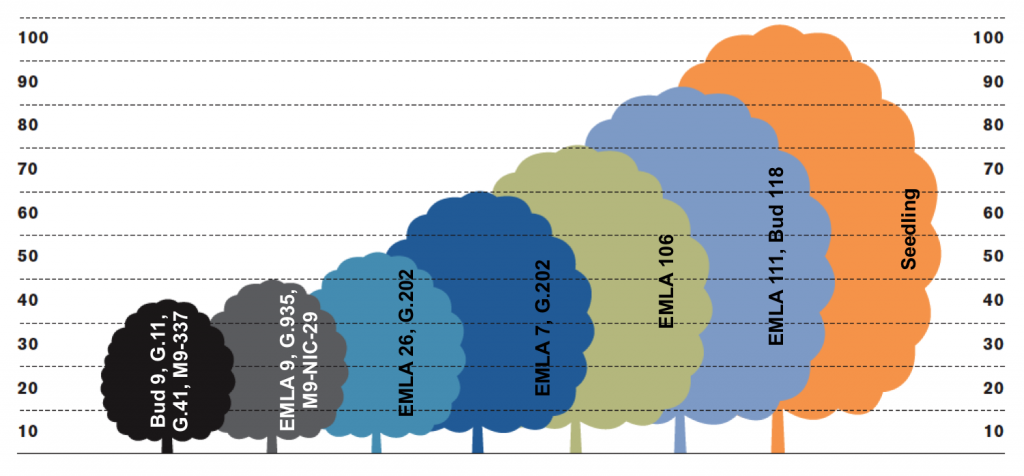Description
Very promising ‘McIntosh’ strain, it is early-colouring with a vibrant red finish. Ruby Macs are very firm and are resistant to premature drop. Colour coverage is nearly complete, with just a few spots of light yellow-green peel where the sun didn’t shine.Fruit is quite juicy, tinted green, and crisp though not hard. The flavours are balanced, though with some pleasing tartness.
Pre-order now to pick up from the farm this spring! Fruit trees DO NOT qualify for shipping.
Select from available product sizes and rootstocks.
See “Rootstock Details” tab below for more information on roostock characteristics.
Scion Latin: Malus ‘Ruby Mac’
Rootstock Latin: Malus ‘Malling 9 selection NIC29’
Hardiness Zone: 5 – 8
Height: 8′ – 15′
Spread: 6′ – 8′
Bloom Time: Spring
Ripens: September
Flower Colour: White
Fruit Colour: Red with small shadows of yellow-green
Foliage Colour: Green
Light Requirements: Full Sun
Soil Requirements: Fertile, well-draining soil. Avoid competition with grass near the base of the tree.
Attributes:
Special Considerations: Apples require cross-pollination with another Malus species (Crabapple, Apple-Crab or Apple) within the same general area such as city block. Dwarf trees may require support.
Budagovsky 9 (B.9) – Dwarfing rootstock resulting from a cross between M.8 x ‘Red Standard’ (Krasnij Standard) from Russia. B.9 has been widely tested and is used commercially. It is slightly more dwarfing than M.9 and is slightly more productive. Other traits of note: Very early precocity; very winter hardy; little suckering; requires support; adapted to well-drained soil; very resistant to crown rot; more fireblight resistant than M.9.
Malling 9 Nic29 (M.9 Nic29) – A dwarfing rootstock selection of M.9 made in Belgium and is slightly more vigorous than other M.9 selections. M.9 is used to impart vigour to cultivars such as Empire or Honeycrisp. Slightly larger tree; between M.9 and M.26 in size. Low to no suckering.
Geneva 2020 (G.202) – Geneva 202 (G.202) is a semi-dwarfing rootstock that produces a tree slightly larger than M.26. It was developed from a cross of M.27 and Robusta 5. It is fire blight and phytophthora resistant as well as having resistance to woolly apple aphids. The rootstock has been mainly tested in New York and New Zealand. In New Zealand, they are looking at this rootstock as a possible replacement for M.26 since it is more productive than M.26
Ottawa 3 (O. 3) – This rootstock was bred in Canada for its cold hardiness, with one parent being M.9. Trees on O.3 are about the size of M.9 EMLA but smaller than M.26. Induces early bearing. Resistant to collar rot, but susceptible to fire blight and woolly apple aphids. Ottawa 3, although being available for many years, has not been popular with the nursery industry. Linden Lane Farms has rootstock from an original, disease-free stool block from the University of Saskatchewan and is looking into grafting local varieties such as ‘Transparent’ for hobbyist growers in the near future.

PAYMENT:
All Spring Plant Reservations have a 50% minimum deposit required to place orders. An order can also be paid in full.
Orders will be placed based on payment of a deposit or full payment. Deposits (50% of order value) cannot be refunded after March 26th, 2020.
Payment can be made by cash, cheque, email money transfer or credit card. Please follow the instructions on your invoice.
ORDERING:
We strongly recommend ordering before March 26th, 2020 to secure your order. Please note that orders after this date are dependent on available inventory. Some stock may have limited available quantities.
Any bulk orders of 50+ plants will be subject to bulk order pricing. Please contact us for bulk orders.
DELIVERY & PICKUP:
Delivery: NEW 2020! Free Delivery on orders over $500, within 30 minutes from Krestova! Please contact us to arrange a delivery date.
Bare-root Stock: Bare-root stock will be available for pickup from the farm in Krestova from March to April. We will send an email confirming the available times for pickup closer to this date.
Potted Nursery & Transplant Stock: All potted SPR orders under $500 must be picked up May (TBA) from the farm in Krestova. We will send an email confirming the available times for pickup closer to this date. We are unable to deliver to Nelson or Castlegar Garden Festivals due to limited space at market.
DELIVERY & PICKUP:
Delivery: NEW 2020! Free Delivery on orders over $500, within 30 minutes from Krestova! Please contact us to arrange a delivery date.
Bare-root Stock: Bare-root stock will be available for pickup from the farm in Krestova from March to April. We will send an email confirming the available times for pickup closer to this date.
Potted Nursery & Transplant Stock: All potted SPR orders under $500 must be picked up May (TBA) from the farm in Krestova. We will send an email confirming the available times for pickup closer to this date. We are unable to deliver to Nelson or Castlegar Garden Festivals due to limited space at market.
This item is for pick-up only and does NOT qualify for shipping via Canada Post.
Delivery: NEW 2020! Free Delivery on orders over $500, within 30 minutes from Krestova! Please contact us to arrange a delivery date.
Only logged in customers who have purchased this product may leave a review.
Reviews
There are no reviews yet.